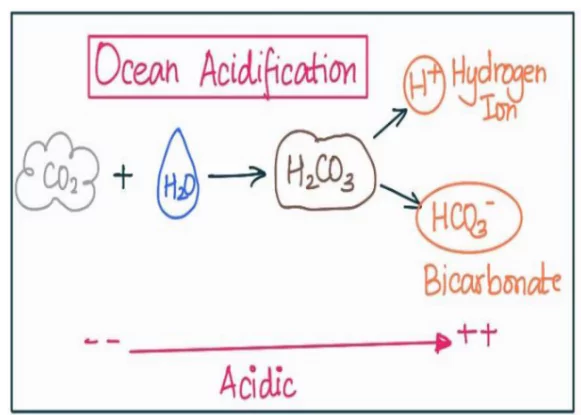Answer:
|
How to approach the question
- Introduction
- Write about ocean acidification briefly
- Body
- Write about the current global frameworks and policies for mitigating the multi-faceted repercussions of ocean acidification.
- Write its multi-faceted repercussions on marine biodiversity, socio-economic pursuits, and geopolitical dynamics
- Write the potential areas for further improvement.
- Conclusion
- Give appropriate conclusion in this regard.
|
Introduction
Ocean acidification is an environmental concern resulting from increased CO2 in the atmosphere. As the ocean absorbs this CO2, it forms carbonic acid, reducing water pH. This acidity threatens marine life, especially shell-forming organisms, potentially disrupting entire aquatic ecosystems and global food chains.
Example- The average global ocean pH has fallen from 8.11 in 1985 to 8.05 in 2020.
Body
Current global frameworks and policies for mitigating these multi-faceted repercussions

- Sustainable Development Goal 14: This UN goal focuses on conserving and sustainably using the oceans, seas, and marine resources, explicitly addressing ocean acidification as one of the targets.
- Global Ocean Acidification Observing Network (GOA-ON): This international collaborative effort improves our understanding of ocean acidification, informing policymakers to make science-based decisions.
- Ocean Acidification Alliance (OA Alliance): It involves governments and organizations in developing actions plans to combat ocean acidification. Example: the state of Washington established a blue-ribbon panel to develop comprehensive strategies for addressing acidification.
- The Ocean Conference: Hosted by the UN, this conference developed a call for action, outlining measures to maintain the health of the world’s oceans, including mitigation of ocean acidification.
- Regional Seas Programmes: There are various UNEP initiatives to protect ocean ecosystems from pollution, including excessive nutrients causing harmful algal blooms that exacerbate acidification, like the Mediterranean Action Plan.
The Multi-faceted repercussions of Ocean Acidification:
On Marine biodiversity:-
- Coral Reef Degradation: Acidic oceans prevent coral reefs, biodiversity hotspots, from maintaining their calcium carbonate structures. The Great Barrier Reef is in continuous decline, home to over 1,500 fish species, is a startling example of this.
- Marine Food Chain Disruption: Acidic waters weaken these shells, endangering these species and disrupting the food chain. For instance, the Pacific oyster industry is facing larval die-offs due to acidification.
- Loss of Biodiversity: The loss of species due to acidification leads to a significant reduction in marine biodiversity. Acidification-driven species loss could mirror the devastating effects seen in the “dead zones” of the Gulf of Mexico.
- Fisheries Decline: Marine fisheries, contributing significantly to global protein needs, face potential collapse. For example, the decline in Alaskan king crab populations, tied to acidification, threatens the viability of a $100 million industry. Researchers have also pointed out that due toocean acidification and rising temperature, global fishing potential can decline by 12% by the end of the century.
On Socio-economic pursuits:-
- Threat to Indigenous Communities: Indigenous communities relying heavily on marine resources face significant risks. For example, acidification of the Arctic Ocean harms the Inuit communities, whose diet and culture are tied to marine mammal hunting.
- Economic Consequences: Acidification impacts marine tourism and recreation, crucial to many coastal economies. Coral bleaching due to ocean acidification threatens the Great Barrier Reef and it can put the Australian tourism industry into peril.
- Threat to Global Food Security: Seafood provides 3.2 billion people with 20% of their animal protein. Ocean acidification threatens this food security, particularly in countries with high dependence on seafood, like Japan and Bangladesh.
On Geopolitical dynamics:-
- Geopolitical Tensions: Ocean acidification can trigger international conflicts over diminishing marine resources. Countries relying on contested fishing grounds, such as those in the South China Sea, could face heightened tensions.
- Displacement and Migration: Reduced fish catches and loss of livelihoods could force coastal communities to migrate, leading to increased socio-political stress. Example: forced migration from the sinking Pacific islands due to rising sea levels.
Potential areas for further improvement
- Improving Carbon Capture and Storage (CCS): Advanced CCS technologies, including Bio- Energy with CCS (BECCS), can help reduce the amount of CO2 reaching the oceans.
- Strict Emission Cuts: While the Paris Agreement is an important step, commitments should be made to achieve more aggressive emission cuts, given the urgency of the ocean acidification problem.
- Expanding Marine Protected Areas (MPAs): There is a need to expand the global network of MPAs and ensure their effective management, which can help in making marine ecosystems more resilient to acidification.
- Ocean Alkalinity Enhancement: This geoengineering approach involves adding alkaline substances to the ocean to counteract acidity. It’s a nascent area that needs further research and careful consideration regarding potential ecological impacts.
- Blue Carbon Market Development: While the potential of blue carbon ecosystems as natural carbon sinks is recognized, there’s a need for a well-functioning market mechanism that provides economic incentives for their conservation and restoration.
- Adaptation Strategies: There’s a need for more targeted strategies to help communities adapt to the impacts of ocean acidification, such as diversifying income sources for those dependent on fisheries or developing new forms of aquaculture that is resistant to ocean acidification.
Conclusion
While current global policies and frameworks provide a foundation for mitigating ocean acidification, substantial work remains. Advancing research, enhancing international cooperation, promoting sustainable practices, and supporting targeted adaptation strategies are critical for accelerating these efforts to help safeguard our oceans against the threats including acidification.
To get PDF version, Please click on "Print PDF" button.


Latest Comments